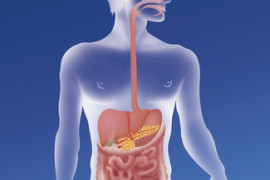A healthy mouth may be especially important for patients with inflammatory bowel diseases, according to a new study published in Oral Diseases.
According to the Mayo Clinic, the most common inflammatory bowel diseases are ulcerative colitis and Crohn’s disease, both of which are characterized by significant pain and inflammation in the digestive tract.
The researchers, who noted that Streptococcus mutans is already known to aggravate ulcerative colitis in mice, found that the presence of several other strains of streptococcus were also associated with the aggravation of this condition in murine subjects. It has been estimated that 20% of oral bacteria are streptococcus—S. mutans, the most common, is primarily associated with dental decay.
Delving further into this association, researchers found that the liver’s response to the bacteria induced an immune reaction—a release of cytokines into the bloodstream—that caused the colitis to worsen.
Oral bacterium F. nucleatum has long been cited as a player in the progression of colorectal cancer, and just last week we reported on a study that found P. gingivalis affects the liver’s regulation of glucose, potentially contributing to the progression of diabetes.
These findings provide greater insight into the mechanisms by which oral disease might influence systemic health conditions. It appears that the harm lies not only in the bacteria themselves, but also in the body’s immune response to the bacteria.
This study provides further evidence that most pathogenic bacteria from the mouth do travel to other parts of the body and do have an influence. Knowing why and how oral bacteria affects inflammatory bowel diseases may give us a greater understanding how we can help the estimated 1 million people in the United States alone that suffer from these conditions.
Source: Aggravation of inflammatory bowel diseases by oral streptococci



